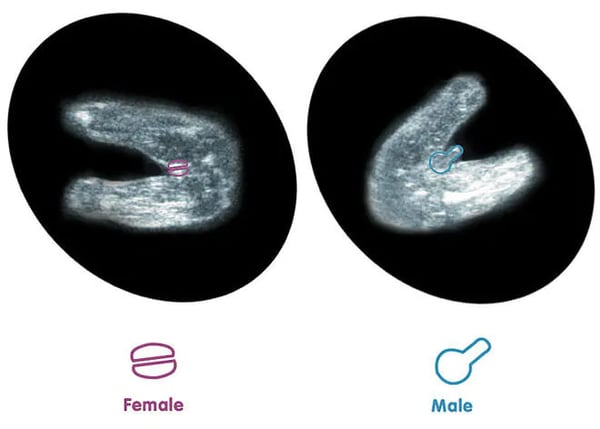Blog

Knowing your baby's sex.....
Tuesday 30th May 2023
The road to giving birth can be a unique and transformative experience for each woman.
From conception, a woman's body begins to undergo a series of changes that culminate in
the birth of a new life. This journey can be physically and emotionally challenging but is also
one of a woman's most profound and rewarding experiences.
Among the many aspects of the road to childbirth, many expecting parents look forward to
the periodic scans. Baby scans, also known as ultrasound scans, are a common way to
monitor the health and development of a growing fetus during pregnancy. These scans use
sound waves to create images of the baby inside the mother's womb, providing important
information about the baby's growth, including the baby's sex. However, knowing this is
often tricky because it differs on a case-to-case basis, meaning not all parents may have
the same experience. The question remains, however: how long until you can know your
baby's sex?
The Short Answer
The short answer is this: most expecting parents learn about their baby's gender during the
20-week scan, but it's not always guaranteed because it depends on the baby's position.
However, this scan is not just about the sex reveal because it's also conducted to detect
any abnormalities and ensure the baby's overall health.
Discovering the gender of the baby is an extra benefit since it's usually apparent after 16
weeks. However, it's worth noting that the sonographer doesn't have to reveal it since their
primary responsibility is to ensure the baby's health. Moreover, they might not have enough
time to determine the baby's sex based on this information alone.
It's also unlikely that you can determine the gender of your baby through an NHS scan at 16
weeks. This is because the only scans typically offered during the initial and middle stages
of pregnancy are the 12-week dating scan, which does not allow for gender identification
and the 20-week anomaly scan.
Getting a Gender Scan
You can get a gender scan done privately after the 16th week of your pregnancy. Many
private scanning facilities offer packages with additional perks such as 4D scans, souvenirs
like teddy bears and photos, and even short videos of your baby's movements.
If you want to keep the gender of your baby a surprise, you can request the sonographer
not to disclose it during the ultrasound and instead write it down in a sealed envelope for
you. This way, you can later have a reveal party using your private and NHS scans.
Using the Scan to Know Your Baby's Sex
In some cases, you can determine the gender of your baby earlier. When the baby is
positioned correctly, and their legs are open, the sonographer may see the sex organs as
early as 14 weeks into the pregnancy. This is because the male and female characteristics
have fully developed.
However, it's still recommended to wait for 16 to 20 weeks to determine the sex of the baby
accurately. This is because during this time, the genitals are more visible, and the baby has
grown bigger, making it easier to see and reducing the likelihood of getting an incorrect
answer.
The Nub Theory
The nub theory is a concept that revolves around the presence of a small swelling called the
genital nub in all embryos. This nub is fixed at conception and is responsible for the
development of the genitals. If the baby is a boy, testosterone starts at seven weeks and
causes the nub to grow into a penis and scrotum. On the other hand, if the baby is a girl, the
genital nub will become the clitoris and labia.
During the first trimester, the genital nub can be seen on a scanned image, but it is difficult
to determine the sex accurately. This is because the nub development is slow, and it is
unclear which direction it is developing at such an early stage. For this reason, it's not
always accurate, and many experts advise against relying solely on the nub theory for
predicting your baby's sex.
Can the Heartbeat Indicate a Baby's Sex?
Many believe that a baby's heartbeat can tell its sex, which, unfortunately, is a myth. This
idea originated from an old story that suggests if a pregnant woman's heartbeat is above
140 beats per minute, she is expecting a baby girl, but if it's below 140 bpm, she's carrying
a boy.
A study published by Fetal Diagnosis and Therapy analysed 966 sonograms of women less
than 14 weeks pregnant. The researchers conducted the same study again during the
second trimester, which is between 18 to 24 weeks of pregnancy when the gender of the
baby can be detected through an ultrasound. At this stage, only 477 women still fit the
requirements for the study, with 244 carrying female fetuses and 233 carrying male fetuses.
The answer is, to no ones surprise, the heartbeat did not predict the babies sexes. The
average heart rate for boys in the first trimester was 154.9 bpm, while it was 151.7 bpm for
baby girls.
Conclusion
The road to childbirth is exciting and full of anticipation, but predicting the baby's sex is one
of the finer aspects. However, it's difficult to tell because various factors can affect the
baby's sex and development. Ultimately, expecting parents should rely on medical
professionals and ultrasound technology to determine the sex of their baby rather than tales
or myths.
If you want to get a pregnancy scan, Numi Scan can help you! We offer various baby scanning
services to help you see your soon-to-be child at affordable prices. Book your gender scan appointment via https://stansted.numiscan.co.uk/





